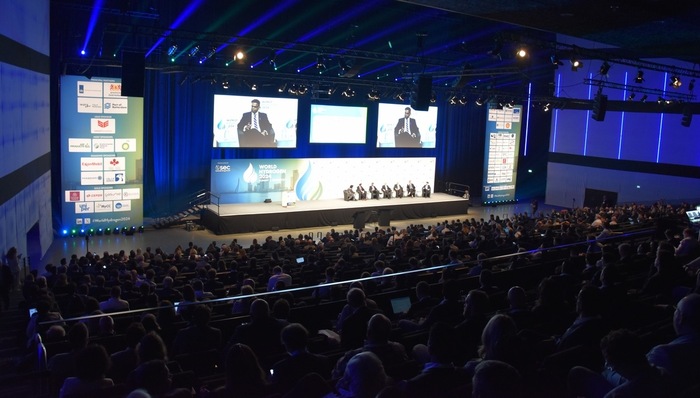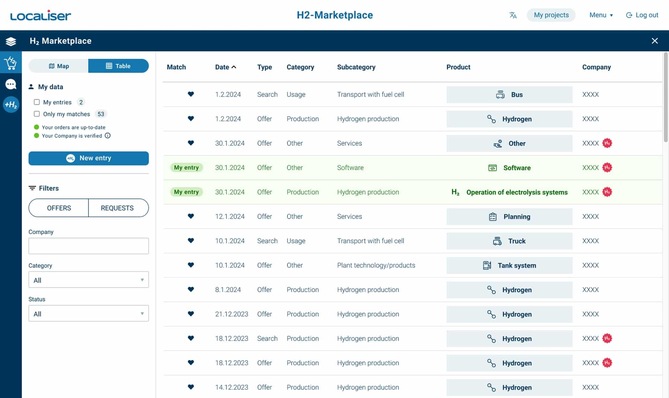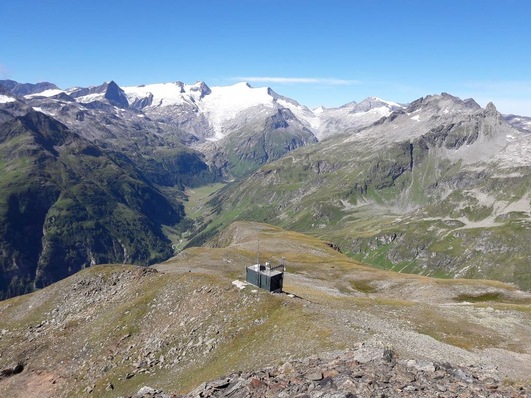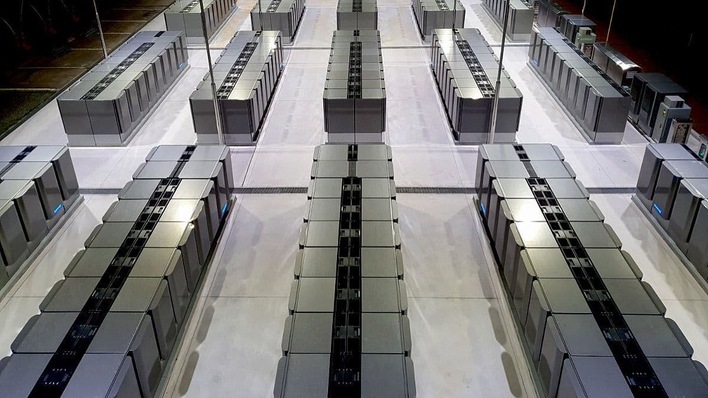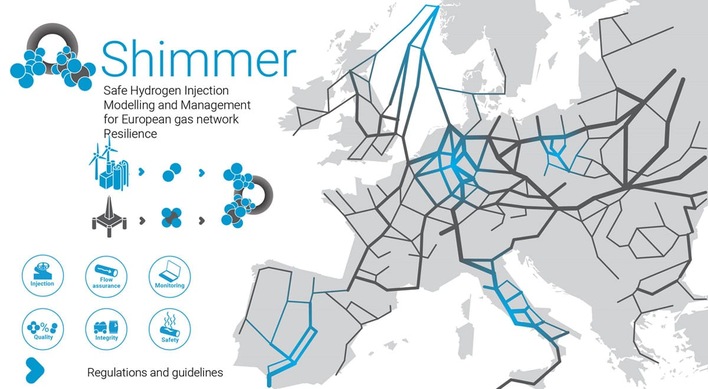HZwei: Governor, it is an honor to be able to speak with you here today. What prompted you to come here to Europe?
Grisham: We have 2.2 million residents that we represent. To be able to do that, we need to know what is happening in the world and see for ourselves. This particular conference is important for us for two reasons: First, there are foreign investors who want to build hydrogen campuses in New Mexico. For them, we are here to present New Mexico as an interesting location with all its assets. And secondly, our global partners are convinced that hydrogen is a fuel for the transformation process of the energy sector.
The awareness in the Netherlands as well as in Europe about climate justice is a powerful role model for the United States as well as some governors to - how shall I say - achieve their own climate goals. We need to become part of a much larger international movement to achieve Net Zero as planned and stop the temperature rise. We also need to address the living conditions of underprivileged populations in particular - New Mexico is a poor state - who are exposed to many emissions or live in regions where fossil fuels dominate.
That is what is being addressed here, that is why we are here.
What kind of companies are involved in New Mexico?
We are already home to a number of hydrogen companies. At the same time, we are the second largest oil and gas producer in the United States. These companies, such as Exxon Mobile, need to reduce their emissions in our state. But, of course, here too, as they are the largest US employer in the Netherlands. They therefore have a great responsibility. We want to keep them in the country and at the same time support their efforts to reduce emissions by facilitating the transition to cleaner fuels, such as hydrogen.
With the H2 campuses you mentioned - are they about research and development, production or what?
Everything. We have acreage (fifth largest US state). And we have two of the five national US research centers, we have incredibly productive soils, we have the largest wind farm in the US with more to come, and we've invested heavily in new power lines. So we can bring green electrons to the grid. That's why we want everything: fuel cells, hydrogen as a fuel, production, heating and cooling - on any scale.
Of course, we have interesting challenges when it comes to water: we have desert and drought due to the climate crisis. This desert geology is good for fossil energy deposits, but we mainly have brackish water. The oil and gas extraction process also produces process water. Both brackish water and process water can be harnessed using modern technology, as we learned from the local environment minister at the COP in Dubai. This means that we too can purify or desalinate our water so that it can be used for hydrogen without reducing our drinking water resources.
As the transformation process from fossil fuels to renewable energy sources is so complex, we want to make use of all these technologies and invite investors and commercial enterprises to settle here. For example, an Australian company recently announced that it will invest 100 million US dollars in a production and research campus.
Where do you see the challenges and opportunities?
This transformation process is cost-intensive. At the same time, there are great opportunities to shape it - not least through the Inflation Reduction Act. Our state has added further tax incentives on top of this, and there are other economic development instruments, so the conditions are really good. This results in good conditions with high profit margins when helping to shape this new market. In this way, we get a foot in the door before the competition starts.
We have the right locations for this. When it comes to settlements, it's all about location advantages - and we have them. Our geology, our connections to the ports on the Gulf Coast and in Los Angeles. Or simply the connection by truck and rail to California and Mexico.
You mentioned additional instruments you have in New Mexico to complement the IRA? What are they?
We do indeed have other incentives, such as the Advanced Energy Equipment Tax Credit, which has been in place since March 2024. This credit offsets up to 20 percent of the manufacturing costs of renewable energy components - up to a maximum of $25 million per project.
What do you think of the IRA?
This was not only productive by President Biden, but also strategically an important step for the transition we all want. We are increasingly realizing that we need this transition, otherwise we might as well stop trying to save the planet. That's why we need to invest a lot of money, which is right, because the US is a big energy consumer and a big oil and gas producer. We need to lead by example not telling other people what to do.
Back to your state: How do you intend to manage the balancing act between the fossil fuel economy and a sustainable energy economy?
In any case, carbon intensity must be reduced in all areas - including oil and gas. The factories must achieve the net zero targets. We now need to decarbonize the mobility sector and move towards hydrogen. We need workers for this and we have to look at where we can get them from. A large proportion of them will obviously come from the oil and gas sector - worldwide - over the next 25 to 35 years. I can tell you exactly how many workers there are, where they come from, what they earn and what their family environment is like.
We have 150,000 people working in the oil and gas industry who need the easiest possible transition to a future energy supply. Because of their previous experience, they all need comparatively little training for other sectors. We have already proven that we can do this with the Energy Transition Act by providing new jobs for over 800 Nawaho coal plant employees.
New Mexico is a leader in the United States on many issues. The oil and gas companies are becoming energy companies that are developing low-carbon solutions to take hydrogen from an idea to a reality. We are supporting these companies along the way. And even if the companies don't help the employees who are laid off, we help those workers.
What about hydrogen? Which production pathways are you focusing on?
We don't worry so much about the colors. I worry more about the carbon intensity. Your hydrogen can be green-plus or white or whatever. What matters is where the origins are. The tax incentives are there to replace your effort to reduce CO2 emissions. All the companies that are here presenting their products want the same thing - and we want to support them.
People out there don't understand the whole discussion about the different colors of hydrogen, because it's all about the same molecules. And we want to be green - or better - greener. However, green hydrogen is now associated with a greater need for water. That's why we need to get as many green electrons as possible into the power line.
This requires a transition scenario, but it will probably be difficult to operate economically with gray hydrogen. Because the cleaner you are, the more support you get from us. We are open to new technologies, but we are certain about carbon intensity.
What do you assume, how can this hydrogen be transported in the most sensible way? By pipeline? Bound in ammonia or methanol? Or in LOHC?
Yes, all of them. Ammoniac seems to be a good solution for oversea transport. There is not enough pipelines infrastructure around the globe. So it has to be all of those formats.
Going to politics, what do you expect from the US election? Will there also be fundamental changes to the IRA if Trump is elected?
Even Republican states don't like it when Washington DC tells us what to do. For example, you can't run a state if you don't have the right infrastructure. Trump will be very aggressive with his statements about not spending his money, but I assume that it will be tight again in Congress. Presidents usually have limited options to do or not do things. So, I'm not really worried.
Even republican states don't like Washington DC telling us what to do. They can't run a state if they don't have the right infrastructure. He will be very aggressive with his remarks about not spending money, but it will be so close in congress that presidents have limited abilities to do or not to do things. So I am not really so concerned.
Interview: Sven Geitmann




